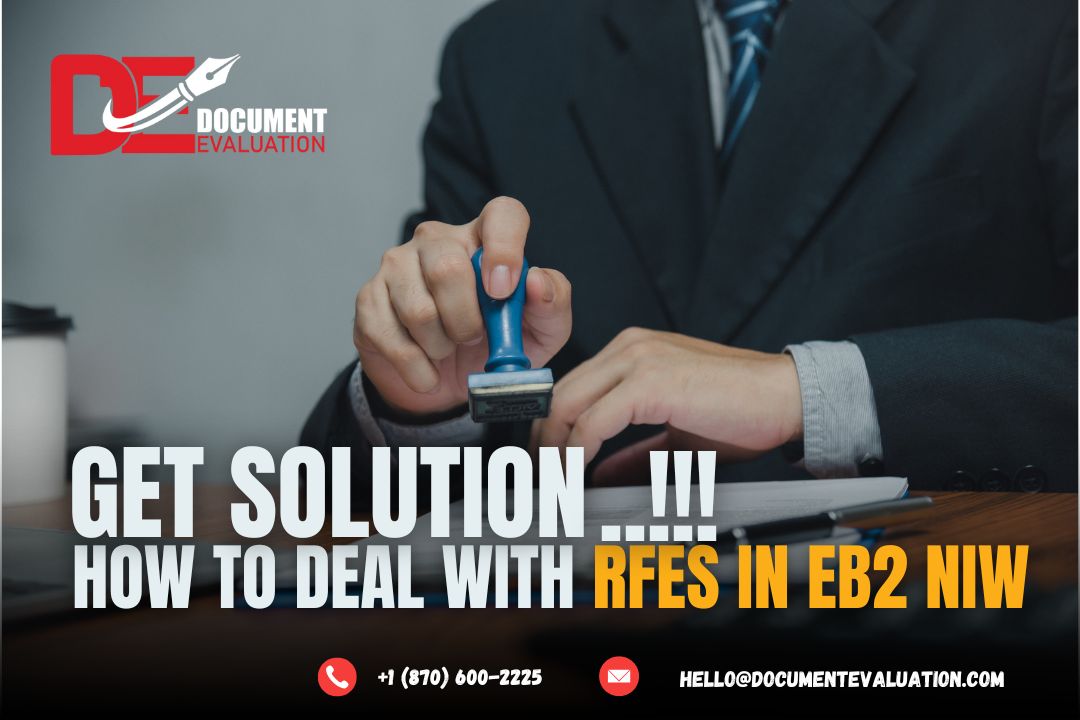Applying for permanent residency in the United States through the EB2 National Interest Waiver (NIW) is a major step for professionals who have proven expertise in their field. It’s an attractive path because applicants don’t need an employer to sponsor them, but it also comes with a unique challenge: demonstrating that your work is in the national interest of the U.S.
One of the strongest ways to do this is through an expert opinion letter. These letters are written by recognized authorities in your profession who can explain your impact in terms that USCIS officers understand. But even with strong documentation, many applicants face a Request for Evidence (RFE) during the process.
In this guide, we’ll break down what an expert opinion letter EB2 NIW is, what an expert opinion letter sample typically looks like, what RFE stands for, and what it means when your case status reads, “response to USCIS’ Request for Evidence was received.”
What is an Expert Opinion Letter for EB2 NIW?
An expert opinion letter for EB2 NIW is a formal recommendation written by an established professional—often a professor, researcher, industry leader, or senior executive—who has firsthand or recognized knowledge of your work. The goal is to show USCIS that your contributions go beyond personal career growth and genuinely benefit the United States.
USCIS officers review thousands of petitions, covering fields as broad as medicine, engineering, environmental sciences, economics, and arts. Since they cannot be experts in all areas, they rely on expert voices to help them understand why a person’s work matters on a national level.
For example:
- A scientist applying for EB2 NIW may include a letter from a renowned professor highlighting how their published research advances U.S. healthcare or technology.
- An entrepreneur may include a letter from an industry leader explaining how their innovations create American jobs or improve economic growth.
The credibility of these experts is just as important as the content of the letter itself.
What Does an Expert Opinion Letter Sample Include?
When people ask about an expert opinion letter sample, they usually want to know what details make a letter strong. While every case is unique, most strong letters share certain qualities:
- Author’s Credentials – The writer should have recognized expertise, academic credentials, or industry authority.
- Clear Relationship – The letter must explain how the expert knows your work (directly or indirectly).
- Detailed Achievements – Instead of vague praise, the letter should highlight concrete accomplishments, publications, awards, patents, or projects.
- National Interest Connection – The expert must show how your contributions benefit the United States beyond just your employer.
A strong expert letter is not about fancy words—it’s about credibility, clarity, and evidence.
What Does RFE Stand For?
In immigration, RFE stands for Request for Evidence.
It’s a notice from USCIS asking for more information before making a final decision. Receiving an RFE can feel discouraging, but it’s not a denial—it simply means the officer needs more proof to be convinced of your eligibility.
In EB2 NIW cases, RFEs usually focus on:
- Missing or unclear documentation, such as academic evaluations or publications.
- Whether the applicant’s work truly rises to the level of “national importance.”
- Whether expert letters are strong enough to demonstrate influence in the field.
How to Respond to an RFE in EB2 NIW Cases
When you see the case update, “response to USCIS’ Request for Evidence was received,” it means USCIS has officially logged the documents you sent. From there, they will review your submission and make a decision.
Here’s how to respond effectively:
- Read the RFE Carefully – Understand exactly what USCIS is asking for.
- Gather Missing Evidence – Collect additional records, publications, or credentials.
- Strengthen with Expert Letters – Submit new or updated expert opinion letters for EB2 NIW that directly address USCIS concerns.
- Be Timely – USCIS gives strict deadlines. A late response can lead to denial.
- Stay Organized – Make sure your response is clear, professional, and easy to follow.
Common Reasons EB2 NIW Applicants Receive an RFE
- Generic Expert Letters – USCIS rejects letters that only contain broad praise without specific evidence.
- Lack of National Interest Proof – If the connection between your work and U.S. benefits is unclear, USCIS may request clarification.
- Insufficient Supporting Documents – Missing publications, patents, or work experience records often trigger an RFE.
- Inconsistent Information – Differences between your resume, application, and expert letters can raise questions.
Why Expert Letters Are Crucial in Avoiding RFEs
Many RFEs happen because applicants submit weak or generic letters. A well-prepared expert opinion letter EB2 NIW can prevent this by directly answering the questions USCIS officers are likely to raise. Instead of vague statements like “this person is talented,” a good letter explains why your work matters to the U.S.
Best Practices to Avoid RFEs in the First Place
- Collect strong supporting documents before filing.
- Use multiple expert letters from different authorities.
- Highlight the national impact of your work, not just personal achievements.
- Work with professionals who understand EB2 NIW requirements.
Final Thoughts
An EB2 NIW petition is a chance to show how your skills and contributions serve the United States. The process may seem overwhelming, but with the right documentation, especially strong expert opinion letters, you can significantly increase your chances of approval.
If you receive an RFE, don’t panic—it’s a common part of the process. What matters is how effectively you respond. With the right strategy, seeing the update “response to USCIS’ Request for Evidence was received” can be the first step toward a successful approval.



